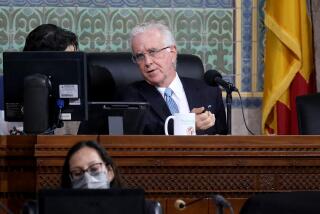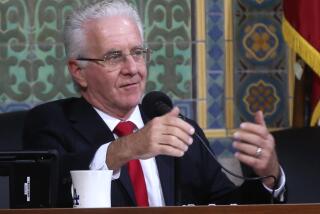New U.N. Rights Panel Is Proposed
- Share via
UNITED NATIONS — The U.N. unveiled a proposal for a new human rights panel Thursday aimed at penalizing member countries that violate human rights, but the measure barely satisfied many diplomats and advocacy groups and prompted the United States to demand new negotiations.
Secretary-General Kofi Annan portrayed the Human Rights Council, which would replace the Human Rights Commission, as the best possible outcome despite its flaws. “Yes, it’s not everything we asked for, but it is a credible basis to move ahead,” he told reporters.
Annan said he hoped the proposal would be approved by the General Assembly next week so the new panel could begin work in June.
U.S. Ambassador John R. Bolton said the proposal did not include provisions the United States wanted that were intended to keep human rights violators off the council. “The strongest argument in favor of this draft is that it is not as bad as it could be,” he said.
Human rights groups grudgingly accepted the new body, saying it was a marginal improvement that could be built on, and that more negotiations would not necessarily make it better, and could risk making it worse.
“It falls short of what we wanted, but it is significantly better than the [current] commission,” said Kenneth Roth, the executive director of New York-based Human Rights Watch.
He called the negotiation process “death by a thousand cuts,” and warned that the whole text could unravel if talks began anew. “Why would the U.S. think that they can do better now than they have done over the last several months?” he asked.
The Geneva-based Human Rights Commission has been criticized as a platform for rights abusers to deflect criticism of their violations rather than a body to help safeguard rights. After the United States lost its seat on the commission and Libya, Sudan, Cuba and Zimbabwe gained membership in recent years as a result of a regional-based selection process, U.S. officials held up the panel as a symbol of the U.N.’s dysfunction. President Bush made its elimination a keystone of American aims for overhauling the U.N.
After four months of wrangling among the U.N.’s 191 member countries, General Assembly President Jan Eliasson presented the compromise document Thursday.
“While no member state has got everything it argued for, the text before you is balanced, strong and workable,” he said. He asked that diplomats keep in mind “the larger issues at stake” and approve the draft quickly.
The proposed council would have 47 members instead of the commission’s 53, there would be a periodic review of members’ human rights records, and the General Assembly could suspend any member found to have committed gross and systematic human rights violations.
Under the new draft, council members must “uphold the highest standards in the promotion and protection of human rights, [and] fully cooperate with the council,” though the assessment is initially up to the country itself.
The draft retains the right of regional groups to put forward a slate of candidates, which has enabled countries with poor human rights records to get on the commission. Countries would be elected individually by secret ballot and would have to win an absolute majority of the General Assembly -- 96 votes -- to gain a three-year seat.
Though Annan and the United States had been pushing to require a two-thirds majority, Roth of Human Rights Watch calculated that few of the worst violators could muster 96 votes.
More to Read
Sign up for Essential California
The most important California stories and recommendations in your inbox every morning.
You may occasionally receive promotional content from the Los Angeles Times.










